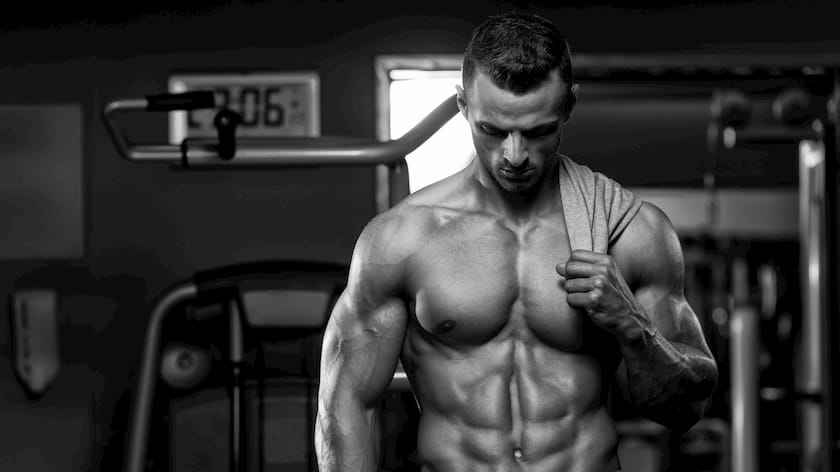Balanced body composition is crucial for overall well-being, representing a healthy mix of muscle, fat, and tissues. It reduces disease risk, boosts energy, and supports a positive body image. Achieving this balance through exercise and a balanced diet is key for a longer, happier, and more active life.

- Debunking Myths for Success: Clearing misconceptions about weight loss and muscle gain is crucial for effective and sustainable results.
- Avoiding Extreme Calorie Restriction: Dispelling the myth that extreme calorie restriction is the best way to lose weight prevents muscle loss and supports metabolic health.
- Balanced Protein Consumption: Debunking the notion that excessive protein alone builds muscles promotes a balanced approach.
- Realistic Goals and Patience: Understanding the importance of consistent, realistic goals and patience encourages long-term success.
- Empowering with Accurate Information: Accurate information empowers individuals to adopt healthier, evidence-based practices for lasting fitness and well-being.
Why Is Setting Realistic Goals Important?
Realistic goals are key for motivation and sustained progress. They align with abilities, preventing frustration and boosting confidence. Attainable milestones foster commitment, prevent burnout, and allow adaptability for long-term success.
Understanding the Science Behind Fat Loss and Muscle Gain
Fat Loss

- Energy Balance for Fat Loss: Burning more calories than consumed leads to fat reduction.
- Basal Metabolic Rate (BMR): BMR influences resting energy expenditure, impacting fat loss.
- Diet Composition: Higher protein intake preserves muscle mass, aiding in fat loss.
- Exercise Importance: Both aerobic and resistance training increase calorie expenditure, supporting fat loss.
- Influential Factors: Hormones, genetics, sleep, and stress management impact fat storage and metabolism.
- Sustainable Lifestyle Changes: Effective fat loss involves maintaining a caloric deficit, healthy eating, and regular exercise.
Muscle Gain

- Muscle Gain Process:
- Resistance training induces muscle fiber damage.
- Repair and growth occur through protein synthesis.
- Adequate protein consumption provides essential amino acids.
- Influential Factors:
- Hormones like testosterone and growth hormone influence muscle growth.
- A slight caloric surplus is needed to support muscle gain.
- Essentials for Muscle Gain:
- Adequate calories and nutrition.
- Sufficient sleep and recovery for muscle repair and growth.
- Crucial Factors for Success:
- Consistency in training.
- Progressive overload by increasing resistance over time.
- Individual Impact:
- Genetics play a role.
- Tailored workout and diet plans maximize results.
Creating the Right Nutrition Plan

Creating the right nutrition plan for fat loss and muscle gain is crucial as it optimizes nutrient intake, supports metabolic goals, and ensures sustainable progress, ultimately maximizing the effectiveness of fitness efforts in individuals.
- Determining Daily Caloric Needs:
- Calculate BMR and TDEE using online calculators.
- Create a caloric deficit of 250-500 calories for fat loss.
- Consume 250-500 calories surplus for muscle gain.
- Prioritize protein intake and adjust based on progress.
- Importance of Protein:
- Crucial for fat loss and muscle gain.
- Promotes satiety and preserves lean muscle mass in fat loss.
- Supplies essential amino acids for muscle repair and growth in muscle gain.
- Calculate protein intake based on body weight, adjusting within recommended ranges.
- Managing Carbohydrates and Fats:
- Moderate carbohydrate intake for fat loss, focusing on complex sources.
- Include healthy fats for hormonal balance.
- Slightly increase carbohydrates for muscle gain, supporting energy and recovery.
- Customize macronutrient ratios based on individual needs for balanced nutrition.
- Meal Timing and Frequency:
- For fat loss, consider smaller, frequent meals to control hunger.
- Prioritize protein around workouts for muscle preservation.
- For muscle gain, focus on higher meal frequency to optimize muscle protein synthesis.
- Choose timing and frequency based on consistency and individual preferences.
Summary
- Determine Caloric Needs:
- Calculate BMR and TDEE for daily caloric needs.
- Create a deficit for fat loss or a surplus for muscle gain.
- Prioritize Protein:
- Ensure sufficient protein intake for muscle preservation and growth.
- Adjust protein levels based on individual needs and progress.
- Manage Carbs and Fats:
- Moderate carbs for stable energy (fat loss) or increased energy (muscle gain).
- Include healthy fats for hormonal balance and overall health.
- Customize Meal Timing:
- Control hunger with smaller, frequent meals (fat loss).
- Optimize muscle protein synthesis with a higher meal frequency (muscle gain).
- Adapt timing based on personal preferences and goals.
Planning Workouts

Effective workouts are key for fat loss and muscle gain. Planning ensures consistency and targeted exercises, optimizing training for successful body composition goals.
- Resistance Training:
- Builds and repairs muscle tissue.
- Increases resting metabolic rate for fat loss.
- Consumes energy, aiding in fat reduction.
- Essential for simultaneous muscle growth and fat loss.
- Cardiovascular Exercises:
- Promote calorie expenditure for fat loss.
- Enhance metabolic efficiency for fat burning.
- Improve cardiovascular fitness.
- Complement resistance training for balanced results.
- Rest and Recovery:
- Allow muscles to repair and grow.
- Prevent overtraining and reduce injury risk.
- Regulate hormones for fat storage and muscle synthesis.
- Adequate sleep and rest days are essential for optimal results.
Summary
Plan your workouts well to stay consistent and target the right exercises. For fat loss and muscle gain, include resistance training to build muscles and boost metabolism. Cardio exercises help burn calories and improve overall fitness. Don’t forget the importance of rest and recovery for muscle repair and hormone balance. A balanced approach, combining resistance and cardio, along with proper rest, is key to achieving your fitness goals.
Avoid These Pitfalls To Achieve Your Goal
Common pitfalls to avoid in fat loss and muscle gain include:
- Extreme Dieting: Drastic calorie restriction can lead to muscle loss and a slowed metabolism, making long-term fat loss harder.
- Neglecting Protein: Inadequate protein intake can hinder muscle growth and recovery. Aim for a balanced protein-rich diet.
- Overtraining: Excessive exercise without proper rest can lead to burnout, injuries, and hinder muscle recovery.
- Inconsistent Routine: Skipping workouts or inconsistency in nutrition makes it difficult to see progress.
- Ignoring Strength Training: Focusing only on cardio and neglecting resistance training can hinder muscle gain.
- Lack of Sleep: Poor sleep can disrupt hormonal balance, affecting both fat loss and muscle growth.
- Not Tracking Progress: Without monitoring, it’s hard to adjust your approach for optimal results.
- Stress and Inadequate Recovery: High stress levels can hinder fat loss and muscle recovery. Prioritize stress management and rest.
- Relying on Supplements: Supplements should complement, not replace, a balanced diet and exercise routine.
- Setting Unrealistic Goals: Expecting rapid changes can lead to frustration and unsustainable practices. Set achievable, gradual goals.
Avoiding these pitfalls and adopting a balanced and sustainable approach is key to successful fat loss and muscle gain.
Suggestion
Your daily protein needs can easily be met by adding the 2 main food groups that contribute to protein. Lean meat and poultry, fish, eggs, tofu, nuts and seeds and legumes/beans together . The second is milk, yoghurt, cheese and/or alternatives (mostly reduced fat) group. As part of a healthy diet, it is recommended to consume particular serves per day from each of the 5 food groups. The human body can’t store protein and will excrete any excess, so the most effective way of meeting your daily protein requirement is to eat small amounts at every meal.
Conclusion
- Holistic Approach: Achieving the dual goals of fat loss and muscle gain requires a holistic approach that encompasses various aspects of your lifestyle.
- Dedication and Patience: The journey to fitness demands dedication and patience. Results may not happen overnight, but consistent effort pays off in the long run.
- Balanced Diet: A key element is maintaining a balanced diet. Focus on nutrient-dense foods, proper portion control, and staying hydrated to support your body’s needs.
- Structured Workouts: Incorporate a well-designed workout routine that combines cardiovascular exercises, strength training, and flexibility exercises to maximize fat loss and muscle gain.
- Proper Sleep: Ensure adequate and quality sleep, as it is crucial for recovery, hormone regulation, and overall well-being.
- Stress Management: Manage stress through relaxation techniques, mindfulness, and other stress-reducing activities. High stress levels can hinder progress in achieving fitness goals.
- Celebrate Progress: Acknowledge and celebrate your achievements along the way. Whether it’s a fitness milestone or a positive change in lifestyle habits, recognizing progress is essential for motivation.
- Long-Term Health Benefits: Remember that the benefits of embracing a healthy lifestyle extend beyond physical appearance. Improved longevity, reduced risk of chronic diseases, increased energy levels, and enhanced mental clarity contribute to a higher quality of life.
- Embrace the Journey: The pursuit of fitness is not just about the destination; it’s about enjoying the journey. Embrace the challenges, learn from setbacks, and stay committed to long-term well-being.
- Feel Better, Look Better: Ultimately, the goal is not just to look better but to feel better. Prioritize your well-being, and your body will reflect the care and effort you invest in it.
Frequently Asked Questions (FAQs)
Q: What is the key to losing fat and gaining muscle simultaneously?
Ans. Achieving a calorie deficit while prioritizing protein intake and resistance training.
Q: Can I lose fat and gain muscle without changing my diet?
Ans. Diet plays a crucial role; you must adjust your nutrition to see significant results.
Q: How much protein should I consume daily for muscle gain?
Ans. Aim for at least 1 gram of protein per pound of body weight.
Q: What type of exercises are best for building muscle?
Ans. Compound exercises like squats, deadlifts, and bench presses are highly effective.
Q: Is cardio necessary for fat loss?
Ans. Cardio can aid in fat loss, but it’s not the sole factor; diet is equally important.
Q: How often should I work out to see results?
Ans. Consistency matters more than frequency; 3-5 days of structured workouts per week is a good start.
Q: Can I lose fat and gain muscle without supplements?
Ans. Yes, supplements are optional; focus on whole foods first.
Q: Is it possible to target fat loss in specific areas?
Ans. Spot reduction is a myth; fat loss occurs throughout the body.
Q: How important is sleep in the fat loss and muscle gain process?
Ans. Quality sleep is crucial for recovery and hormonal balance.
Q: Can I achieve these goals at any age?
Ans. Yes, people of all ages can lose fat and gain muscle with the right approach.
Q: What should I do if I hit a plateau in my progress?
Ans. Change your workout routine, adjust your diet, or consult a fitness expert.
Q: Are cheat meals allowed in this journey?
Ans. Occasional indulgences are fine, but don’t let them derail your overall progress.
Q: What’s the role of hydration in fat loss and muscle gain?
Ans. Staying hydrated aids in metabolism and performance; aim for adequate water intake.
Q: How long does it take to see noticeable results?
Ans. Results vary, but typically, visible changes can be seen in a few weeks to a few months.
Q: What’s the most important piece of advice for success in this journey?
Ans. Consistency and patience are key; remember that sustainable changes lead to lasting results.


